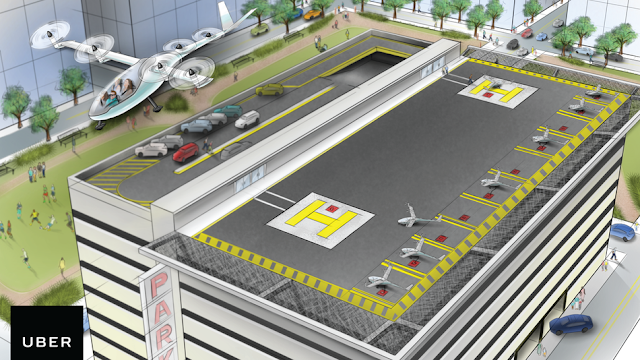Uber is ready to make its flying car project a reality
Uber's flying car plans are coming together — and it looks like it won't be taking to the skies alone.
The company's aspiration to build an urban air transportation network took a major leap on Tuesday with its Elevate Summit event in Dallas. The three-day conference was billed as a chance to spread the news about Uber's plans for its flying cars and "identify and accelerate opportunities to collaborate within the community," boasting a diverse line-up of presenters with backgrounds ranging from NASA and public office to CEOs of aerospace companies.
Uber first outlined its concept for an autonomous, on-demand flight system, dubbed Uber Elevate, in a white paper released last October. That plan depends on the development of electric vertical take-off and landing aircrafts, or eVTOLs, along with the infrastructure to make catching a flying cab just as easy as hailing a normal car. The company also hired veteran NASA engineer Mark Moore back in February to help spearhead the project's development.
Uber's Chief Product Officer Jeff Holden opened the Elevate event with a wide-ranging keynote address, covering the current state of Uber's project, its existing partnerships with aerospace companies and even cities, and the bold goal of debuting a prototype of a craft by 2020. "Flying cars have been promised for decades, but are arriving now," he said, staking out the company's aggressive goal to make flying cars a reality.
Holden's keynote rehashed many of the details the company previously published in its white paper, as he showed off some of the same figures and charts touting Uber's current ride sharing system and its nascent plans to develop a functional flying vehicle and urban aviation system.
The big news from the keynote is the partnerships the company has or is pursuing to actually build the network, taking it from "the notional to the concrete," as Holden said. Uber has "begun conversations" about partnering with NASA and the FAA about development and testing for the air traffic systems needed to make Elevate possible, and Holden touted speakers from both agencies slated to present at the conference.
He also announced partnerships with aviation companies that already have eVTOL systems in development, including Bell Helicopter, Aurora, Embraer and Mooney, to help develop the flying vehicles. Holden said the eVTOLs would first be manned, but eventually could become fully autonomous. There's also an agreement in place with Charge Point to develop the batteries and charging infrastructure needed for a wide eVTOL network.
To cap off the keynote, Holden announced the eVTOL operations will launch in Dallas, with a goal to kick off the program by 2021. Uber will begin developing the physical infrastructure — landing pads called "vertiports"— needed for the system in the city as early as next year.
The project will expand internationally to Dubai, which has already proven to be primed for air taxi service. There, Uber will partner with the city's Road and Transport Authority to develop the network. The current goal is to have a working prototype or even conduct passenger flights as part of the planned Expo 2020 event in the city.
"We're going to see how fast we can make this a reality," Holden said to close his remarks. "We know this is possible, we know this is going to happen."
These plans and partnerships are undeniably exciting — if Uber can stick to its projected schedule, we could have a flying car before some automakers are even projected to roll out their self-driving systems on the road.
But this is all speculative. As Uber's efforts in that self-driving space have shown, "move fast and break things" isn't always the best method to develop paradigm-shifting technology. We'll remain cautiously optimistic until the day we see the flying cars zooming overhead.

No comments:
Post a Comment